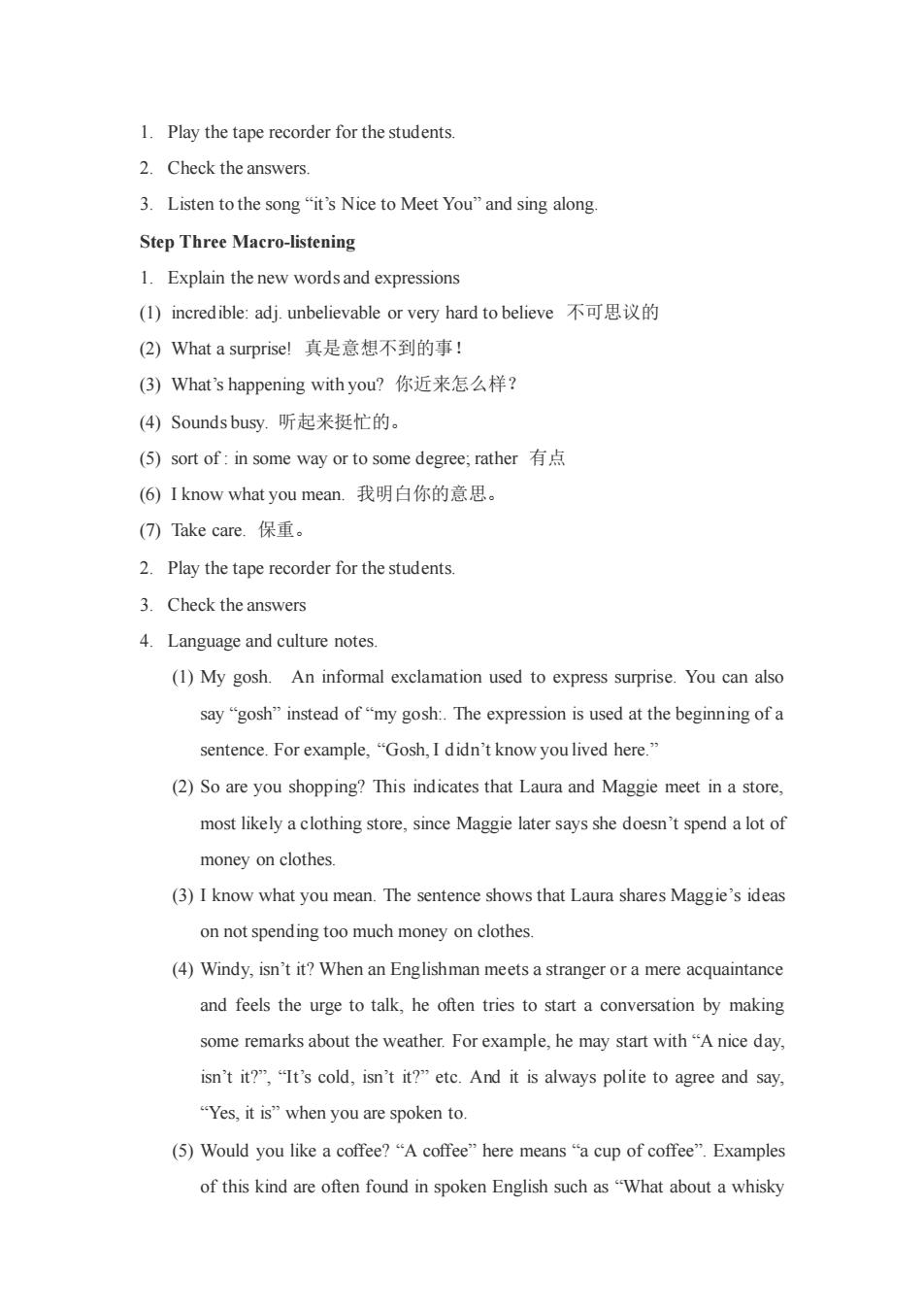正在加载图片...

1.Play the tape recorder for the students. 2.Check the answers. 3.Listen to the song"it's Nice to Meet You"and sing along Step Three Macro-listening 1.Explain the new words and expressions ())incredible::adj.unbelievable or very hard to believe不可思议的 (2)What a surprise!真是意想不到的事! ()What's happening with you?你近来怎么样? (4)Sounds busy,听起来挺忙的。 (⑤)sort of:in some way or to some degree,rather有点 (⑥I know what you mean.我明白你的意思。 (7)Take care.保重。 2.Play the tape recorder for the students. 3.Check the answers 4.Language and culture notes. (1)My gosh.An informal exclamation used to express surprise.You can also say"gosh"instead of"my gosh:The expression is used at the beginning of a sentence.For example,"Gosh,I didn't know youlived here." (2)So are you shopping?This indicates that Laura and Maggie meet in a store, most likely a clothing store,since Maggie later says she doesn't spend a lot of money on clothes (3)I know what you mean.The sentence shows that Laura shares Maggie's ideas on not spending too much money on clothes. (4)Windy,isn't it?When an Englishman meets a stranger ora mere acquaintance and feels the urge to talk,he often tries to start a conversation by making some remarks about the weather.For example,he may start with"A nice day, isn't it?","It's cold,isn't it?"etc.And it is always polite to agree and say. "Yes,it is"when you are spoken to. (5)Would you like a coffee?"A coffee"here means"a cup of coffee".Examples of this kind are often found in spoken English such as"What about a whisky1. Play the tape recorder for the students. 2. Check the answers. 3. Listen to the song “it’s Nice to Meet You” and sing along. Step Three Macro-listening 1. Explain the new words and expressions (1) incredible: adj. unbelievable or very hard to believe 不可思议的 (2) What a surprise! 真是意想不到的事! (3) What’s happening with you? 你近来怎么样? (4) Sounds busy. 听起来挺忙的。 (5) sort of : in some way or to some degree; rather 有点 (6) I know what you mean. 我明白你的意思。 (7) Take care. 保重。 2. Play the tape recorder for the students. 3. Check the answers 4. Language and culture notes. (1) My gosh. An informal exclamation used to express surprise. You can also say “gosh” instead of “my gosh:. The expression is used at the beginning of a sentence. For example, “Gosh, I didn’t know you lived here.” (2) So are you shopping? This indicates that Laura and Maggie meet in a store, most likely a clothing store, since Maggie later says she doesn’t spend a lot of money on clothes. (3) I know what you mean. The sentence shows that Laura shares Maggie’s ideas on not spending too much money on clothes. (4) Windy, isn’t it? When an Englishman meets a stranger or a mere acquaintance and feels the urge to talk, he often tries to start a conversation by making some remarks about the weather. For example, he may start with “A nice day, isn’t it?”, “It’s cold, isn’t it?” etc. And it is always polite to agree and say, “Yes, it is” when you are spoken to. (5) Would you like a coffee? “A coffee” here means “a cup of coffee”. Examples of this kind are often found in spoken English such as “What about a whisky